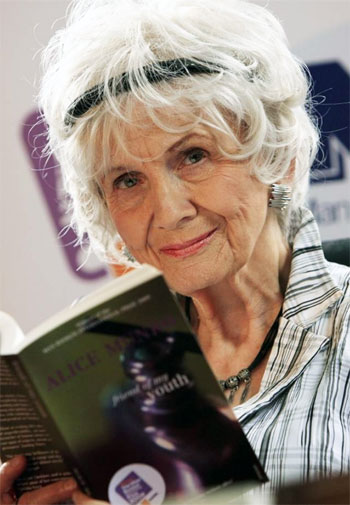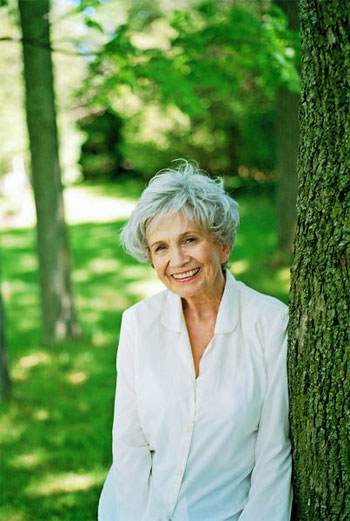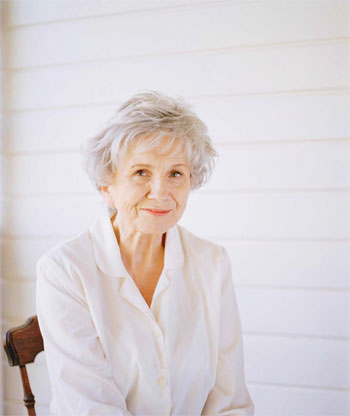|
|
|
 , ,
Font size |
Alice Munro: The Nobel Prize in Literature 2013
 Alice
Ann Munro was born on 10th July 1931. She is a Canadian author writing in
English. The recipient of the 2013 Nobel Prize in Literature and the 2009 Man
Booker International Prize for her lifetime body of work, she is also a
three-time winner of Canada's Governor General's Award for fiction. The focus of
Munro's fiction is her native Huron County in southwestern Ontario. Her
"accessible, moving stories" explore human complexities in a seemingly
effortless style. Munro's writing has established her as "one of our greatest
contemporary writers of fiction," or, as Cynthia Ozick put it, "our Chekhov." In
2013, Munro was awarded the Nobel Prize in Literature for her work as "master of
the modern short story". Alice
Ann Munro was born on 10th July 1931. She is a Canadian author writing in
English. The recipient of the 2013 Nobel Prize in Literature and the 2009 Man
Booker International Prize for her lifetime body of work, she is also a
three-time winner of Canada's Governor General's Award for fiction. The focus of
Munro's fiction is her native Huron County in southwestern Ontario. Her
"accessible, moving stories" explore human complexities in a seemingly
effortless style. Munro's writing has established her as "one of our greatest
contemporary writers of fiction," or, as Cynthia Ozick put it, "our Chekhov." In
2013, Munro was awarded the Nobel Prize in Literature for her work as "master of
the modern short story".
Munro was born Alice Ann Laidlaw in Wingham, Ontario. Her father, Robert Eric
Laidlaw, was a fox and mink farmer, and her mother, Anne Clarke Laidlaw (n�e
Chamney), was a schoolteacher. Munro began writing as a teenager, publishing her
first story, "The Dimensions of a Shadow," in 1950 while studying English and
journalism at the University of Western Ontario under a two-year scholarship.
During this period she worked as a waitress, a tobacco picker, and a library
clerk. In 1951, she left the university, where she had been majoring in English
since 1949, to marry fellow student James Munro. They moved to Dundarave, West
Vancouver, for James's job in a department store. In 1963, the couple moved to
Victoria, where they opened Munro's Books, which still operates.
Munro's highly acclaimed first collection of stories, Dance of the Happy Shades,
won the Governor General's Award, Canada's highest literary prize. That success
was followed by Lives of Girls and Women, a collection of interlinked stories
sometimes erroneously described as a novel. In 1978, Munro's collection of
interlinked stories Who Do You Think You Are? was published (titled The Beggar
Maid: Stories of Flo and Rose in the United States). This book earned Munro a
second Governor General's Literary Award. From 1979 to 1982, she toured
Australia, China and Scandinavia. In 1980 Munro held the position of writer in
residence at both the University of British Columbia and the University of
Queensland. Through the 1980s and 1990s, she published a short-story collection
about once every four years.
Munro's stories have appeared frequently in publications such as The New Yorker,
The Atlantic Monthly, Grand Street, Mademoiselle, and The Paris Review. In
interviews to promote her 2006 collection The View from Castle Rock, Munro
suggested that she might not publish any further collections. She later recanted
and published further work. Her collection Too Much Happiness was published in
August 2009. Her story "The Bear Came Over the Mountain" was adapted for the
screen and directed by Sarah Polley as Away from Her, starring Julie Christie
and Gordon Pinsent. It debuted at the 2006 Toronto International Film Festival
and was nominated for an Academy Award for Best Adapted Screenplay, but lost to
No Country for Old Men.
On 10 October 2013, Munro was awarded the Nobel Prize in Literature, cited as a
"master of the contemporary short story". She is the first Canadian and the 13th
woman to receive the Nobel Prize in Literature.
Many of Munro's stories are set in Huron County, Ontario. Her strong regional
focus is one of the features of her fiction. Another is the omniscient narrator
who serves to make sense of the world. Many compare Munro's small-town settings
to writers from the rural South of the United States. Her female characters,
though, are more complex. Much of Munro's work exemplifies the literary genre
known as Southern Ontario Gothic.
Munro's work is often compared with the great short-story writers. In her
stories, as in Chekhov's, plot is secondary and "little happens." As with
Chekhov, Garan Holcombe notes: "All is based on the epiphanic moment, the sudden
enlightenment, the concise, subtle, revelatory detail." Munro's work deals with
"love and work, and the failings of both. She shares Chekhov's obsession with
time and our much-lamented inability to delay or prevent its relentless movement
forward."
A frequent theme of her work�particularly evident in her early stories�has been
the dilemmas of a girl coming of age and coming to terms with her family and the
small town she grew up in. In recent work such as Hateship, Friendship,
Courtship, Loveship, Marriage (2001) and Runaway (2004) she has shifted her
focus to the travails of middle age, of women alone and of the elderly. It is a
mark of her style for characters to experience a revelation that sheds light on,
and gives meaning to, an event.
 Munro's prose reveals the ambiguities of life: "ironic and serious at the same
time," "mottoes of godliness and honor and flaming bigotry," "special, useless
knowledge," "tones of shrill and happy outrage," "the bad taste, the
heartlessness, the joy of it." Her style places the fantastic next to the
ordinary, with each undercutting the other in ways that simply and effortlessly
evoke life. Munro's prose reveals the ambiguities of life: "ironic and serious at the same
time," "mottoes of godliness and honor and flaming bigotry," "special, useless
knowledge," "tones of shrill and happy outrage," "the bad taste, the
heartlessness, the joy of it." Her style places the fantastic next to the
ordinary, with each undercutting the other in ways that simply and effortlessly
evoke life.
As Robert Thacker notes:
"Munro's writing creates... an empathetic union among readers, critics most
apparent among them. We are drawn to her writing by its verisimilitude � not of
mimesis, so-called and... 'realism' � but rather the feeling of being itself...
of just being a human being." Many critics have asserted that Munro's stories
often have the emotional and literary depth of novels. Some have asked whether
Munro actually writes short stories or novels. Alex Keegan, writing in Eclectica,
gave a simple answer: "Who cares? In most Munro stories there is as much as in
many novels."
Munro married James Munro in 1951. Their daughters Sheila, Catherine, and Jenny
were born in 1953, 1955, and 1957 respectively; Catherine died 15 hours after
birth.
In 1963, the Munros moved to Victoria where they opened Munro's Books, a popular
bookstore still in business. In 1966, their daughter Andrea was born. Alice and
James Munro divorced in 1972.
Munro returned to Ontario to become writer in residence at the University of
Western Ontario, and in 1976 received an honorary LLD from the institution. In
1976, she married Gerald Fremlin, a cartographer and geographer she met in her
university days. The couple moved to a farm outside Clinton, Ontario, and later
to a house in Clinton, where Fremlin died on 17 April 2013, aged 88. At a
Toronto appearance in October 2009, Munro indicated that she had received
treatment for cancer and for a heart condition requiring coronary-artery bypass
surgery.
In 2002, her daughter Sheila Munro published a childhood memoir, Lives of
Mothers and Daughters: Growing Up With Alice Munro.
Original short-story collections of Alice Munro
-
Dance of the Happy Shades � 1968 (winner of the 1968 Governor General's Award
for Fiction)
-
Lives of Girls and Women � 1971
-
Something I've Been Meaning to Tell You � 1974
-
Who Do You Think You Are? � 1978 (winner of the 1978 Governor General's Award
for Fiction; also published as The Beggar Maid)
-
The Moons of Jupiter � 1982 (nominated for a Governor General's Award)
-
The Progress of Love � 1986 (winner of the 1986 Governor General's Award for
Fiction)
-
Friend of My Youth � 1990 (winner of the Trillium Book Award)
-
Open Secrets � 1994 (nominated for a Governor General's Award)
-
The Love of a Good Woman � 1998 (winner of the 1998 Giller Prize)
-
Hateship, Friendship, Courtship, Loveship, Marriage � 2001 (republished as Away
From Her)
-
Runaway � 2004 (winner of the 2004 Giller Prize) ISBN 1-4000-4281-X
-
The View from Castle Rock � 2006
-
Too Much Happiness � 2009
-
Dear Life � 2012
Short-story compilations of Alice Munro
-
Selected Stories � 1996
-
No Love Lost � 2003
-
Vintage Munro � 2004
-
Carried Away: A Selection of Stories � 2006
-
New Selected Stories � 2011
Awards to Alice Munro
-
Governor General's Literary Award for English language fiction (1968, 1978,
1986)
-
Canadian Booksellers Award for Lives of Girls and Women (1971)
-
Shortlisted for the annual (UK) Booker Prize for Fiction (now the Man Booker
Prize) (1980) for The Beggar Maid
-
Marian Engel Award (1986)
-
Trillium Book Award for Friend of My Youth (1991), The Love of a Good Woman
(1999) and Dear Life (2013)
-
WH Smith Literary Award (1995, UK) for Open Secrets
-
PEN/Malamud Award for Excellence in Short Fiction (1997)
-
National Book Critics Circle Award (1998, U.S.) For The Love of a Good Woman
-
Giller Prize (1998 and 2004)
-
Rea Award for the Short Story (2001) given to a living American or Canadian
author.
-
Libris Award
-
O. Henry Award for continuing achievement in short fiction in the U.S. for
"Passion" (2006) and "What Do You Want To Know For" (2008)
-
Man Booker International Prize (2009, UK)
-
Canada-Australia Literary Prize
-
Commonwealth Writers Prize Regional Award for Canada and the Caribbean.
-
Nobel Prize in Literature (2013) as "master of the contemporary short story".
Honours to Alice Munro
-
Foreign Honorary Member of the American Academy of Arts and Letters 1992
-
Royal Society of Canada's Lorne Pierce Medal 1993
-
Medal of Honor for Literature from the U.S. National Arts Club 2005
-
Knight of the Order of Arts and Letters 2010
-
Five stories of Alice Munro and their critical acclaim.
-
�Lives of Girls and Women� (Lives of Girls and Women, 1971)
Few write about the horror and thrill of budding sexuality as well as Munro, an
experience that runs in parallel with so many other things: self-discovery,
self-assertion, the dynamics of gender and power. Here, young Del Jordan has a
teasing, tantalizing flirtation with the gentleman friend of her mother�s
boarder. It contains possibly the most comic description of an unwanted penis
you will ever read.
 �The Moons of Jupiter� (The Moons of Jupiter, 1982) �The Moons of Jupiter� (The Moons of Jupiter, 1982)
A good primer for how Munro�s stories often look one way but feel another. With
her father in the hospital and her own daughter absent, the narrator visits a
planetarium. A planetarium, of course! And yet the usually reliable
celestial-body metaphor somehow fails to adequately explain the blank space that
sits, helplessly, between family members. You feel that this is possibly the
point.
�The Love of a Good Woman� (The Love of a Good Woman, 1998)
The frequent, somewhat silly refrain is that Munro squeezes a novel into each
story. That description is more apt than usual with the long �Love of a Good
Woman,� which any reader should sink into with ease. Sex! Murder! A small town!
And a hold-your-breath ending in which love and death feel like equal
possibilities.
�Family Furnishings� (Hateship, Friendship, Courtship, Loveship, Marriage, 2001)
An aspiring writer (a little-noted recurring figure in Munro) grows to disdain a
close family friend she once admired as a child. Only Munro could pull this off:
She hides within the story�s folds a deep family secret that, when revealed,
somehow ends up taking second place to a chilling awareness that the narrator
has about her own nature.
�Dear Life� (Dear Life, 2012)
Possibly Munro�s final story (or memoir, depending), but don't save it for
last�it is that good, and that representative of Munro�s artistic project. The
story hinges on a memory that cannot be a real memory: the narrator as an infant
being whisked inside the house by her mother as a neighbor approaches. What
seems at first a meandering investigation becomes, quite suddenly, a
fine-pointed insight into the mother-daughter relationship that anchors so much
of Munro�s work, and feeds so much of its regret, determination, and affection.
Video
Dated 14 October 2013
|
|
|
|
|
|
|









